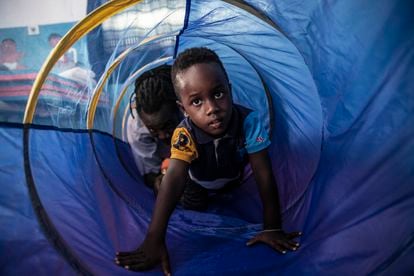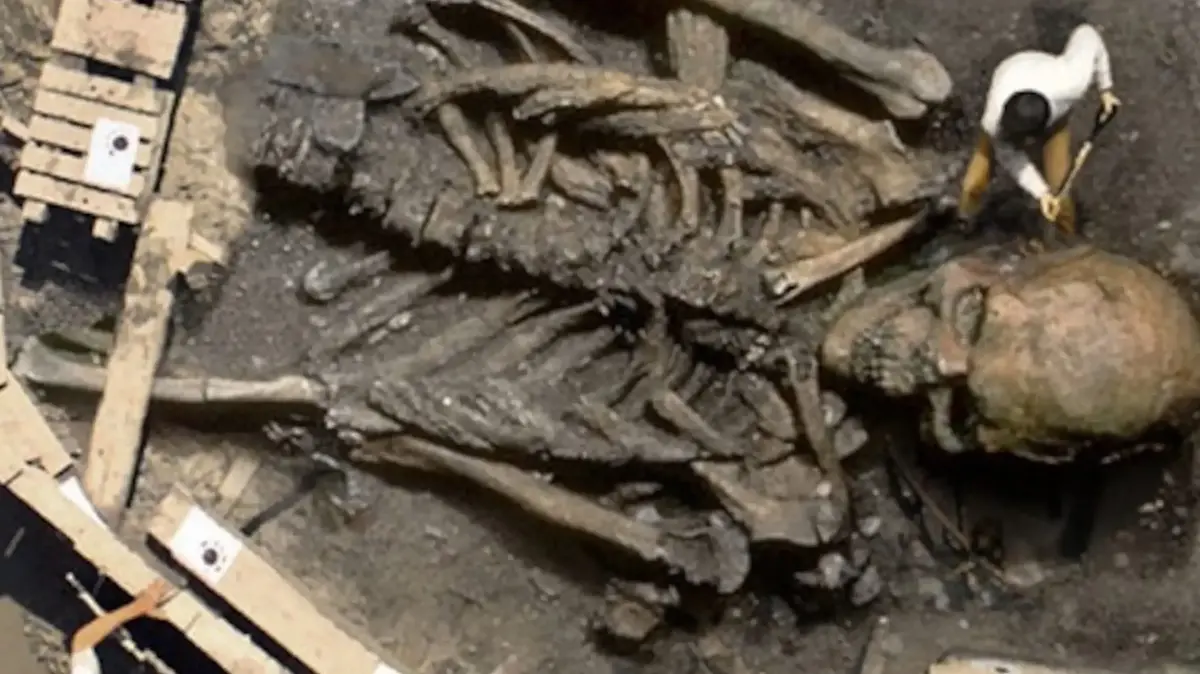Note to readers: EL PAÍS offers the Future Planet section for its daily and global information contribution on the 2030 Agenda. If you want to support our journalism,
subscribe here.
The pregnancy was healthy.
Isemene Henriqueta Quintino attended her prenatal consultations and everything was fine until she began to bleed prematurely.
"They sent me home, but I came back the next day."
It was too late: her daughter had suffered such a lack of oxygen that she was born with cerebral palsy.
The 23-year-old young mother knew something was wrong with her daughter, although no one explained exactly what.
“She suffered three stops and they had to revive her.
I was alone".
A month later they were discharged and returned home.
There began another ordeal.
“I cried a lot, day and night.
And my grandmother and my aunt began to say that it was a
go
and threw me out.
PHOTO GALLERY |
The deadly tradition of 'letting go' of baby spirits
They call them irã, which in the Creole language of Guinea Bissau means spirit or demon. It is the only name given to many children who are born with a disability or disorder, from cerebral palsy to epilepsy, or who just seem to have them. The elders of some animist ethnic groups say that they are not human and that they have to return to the place from which they came, the afterlife. Or that they must be disposed of because they are capable of wicked acts of witchcraft. This is how they justify selective infanticide.
They tried to convince Quintino to do the ceremony.
"They wanted me to kill her," says the mother without palliative.
The ritual consists of taking the baby to the sea.
A ball of rice or egg flour is prepared and, if it is thrown at it, it is resolved that it is an evil spirit and must be left there to be carried away by its own people, carried away by the waves and returned to the afterlife.
Sometimes they are also locked in a room without windows or light for a week.
If he dies, they consider that he was not a human being and has returned to the place from which he came.
More information
These women weave their destiny
In search of the next Ansu Fati
"Guinea Bissau has the ambition to be a priority country for Spanish cooperation"
"They are crimes that are practiced in a hidden way so as not to stay with children with disabilities," warns Khady Florence Dabo, president of the country's Institute for Women and Children. In Guinea Bissau, there are 4.5% of children between two and four years old with some type of disability, the majority with "behavioral dysfunction" and almost zero with problems with seeing, hearing, walking or motor lack of coordination. In adults, the percentage drops to 1% of men and 2.7% of women with “some functional difficulty”, in terms of the Multiple Indicator Survey (MICS) published in 2020. Far below the global average: in the world, 15% of the population lives with a disability.
In Guinea Bissau, at position 175 out of 186 on the UN Human Development Index, surviving infanticide camouflaged by tradition is often followed by an existence without identity, hidden and hidden. “There is a lot of stigma around the belief that a person with a disability is not a human being. Family conflicts occur because they are accused of being at fault, ”says Ana Muscuta Turé, president of the National Council of Women with Disabilities. “And when they don't kill them, they don't give them a name or register them. In practice, they do not study. Nothing. For women it is worse, because they are also raped and, if they have children, they are doomed to begging, "she denounces.
Unicef collects some research findings on the subject in its latest report on the state of childhood in the country, in 2019. “Many barriers were identified that prevent minors with disabilities from enjoying their rights,” it indicates.
One of them is the difficult access to public health services and the habit of going to the traditional healer.
"This led to a late diagnosis, delay, or no treatment in three out of four (76%) children in the study."
The ritual consists of taking the baby to the sea, preparing a ball of rice flour or egg and, if it is thrown at it, it is resolved that it is an evil spirit and must be abandoned there
In addition, Unicef describes, the social perceptions of children with disabilities or disorders were almost completely negative and this caused a general indifference and, at times, hostility towards them. Thus, "differential treatment" was detected by their parents (83%), health professionals (53%) and teachers (68%). According to the study, at least 80% of the cases of abandonment of babies in the cities analyzed, including the capital, were due to disabilities present in the child.
Isemene Henriqueta Quintino decided to fight for her daughter, Jean Philippe Mendy, who is already one year old. Homeless, without family or government support, in one of her visits to the hospital, she met Paula Butian, director and social health assistant of the NGO Aida in Guinea Bissau. Although she tried to support herself and work on the cashew nut harvesting campaign, which begins in mid-April, the mother found that she could not leave her child alone for a minute. She was afraid that the family would take her away and disappear forever. “It is the second baby born like this to the family. My aunt's had the ceremony and they let him die. She tried to convince me to do the same ”.
Faced with the desperate situation, Aida gave her shelter in her foster home and will help the little girl in her rehabilitation center for children with disabilities in Bissau. Now Quintino can tell her story and is determined to get ahead. “I decided I couldn't cry anymore,” she says in Portuguese, the language in which she writes poetry in her notebook about the experience of being a mother and the courage to face the traditions that kill. She also takes care of the baking when there is a celebration, but she wants to be a doctor.
Butian says they need to expand the foster home. "By providing them with a place to stay temporarily, it is possible to ensure that they do not get killed," says Aida's social and health assistant. In addition to this home for courageous mothers, with the contributions of partners, the solidarity bookstores that the organization has in Spain, projects with other entities such as Solidarity Children or European Union programs, the NGO maintains open a rehabilitation and development center for children with disabilities.
188 children are cared for at its facilities and another 66 are on the waiting list. “We give priority to those who have epilepsy because they do not treat their ailment considering that they are not human beings. Most of them try traditional methods and since they don't work for them, they come here ”, reasons the person in charge. The second aspect is age because "the younger they are, the more likely it is that the therapy will work." “We also see the social needs of parents; we go to their homes, we evaluate the support we can give them, for example: a bed, a cart, help to start a business ”, adds Butian.
Most of his patients suffer from cerebral palsy, then epileptics, Down syndrome and others.
In the Aida center they go through consultation, follow-up, therapy and are dispensed free medicines.
The speech therapy room is not very big, but it is bright, it has everything you need, with lots of color.
Sensory stimulation is done here and it is also a reading room.
In the motor physical therapy space, specialists work on motor skills with children.
They told me it was an iran, that if I didn't kill him, he would kill me
Salimatu Embalo, mother of a child with cerebral palsy
Four-year-old Tcherno Kachide Balde crawls across the room, going from one side of a tube to the other following the instructions of his therapists. At the end, a candy or a game awaits you. “He was born with a fever and he was never well. I began to notice that I was not holding my head and a doctor told me that I needed physiotherapy, ”recalls the mother, Salimatu Embalo, 26 years old. The doctor who told him that the child could get better was a neighbor and one of the specialists at the Aida center. "Other people told me that I was not a person, but I did not succumb to a traditional treatment."
It wasn't just the hurtful words that Embalo had to fight. "They told me it was an irã, that if I didn't kill him, he would kill me," he gets emotional. “They made me feel very bad. But I thought that if I was not a go, how could my child be? That is why I decided to fight. He's my son, ”he continues after a silent pause. Since the baby was six months old, the pressure began because he began to notice that he was not holding on while sitting. When Kachide was one year old, his relatives took it a step further. “My family took me to Bafatá (a city in the interior of the country) and they held a meeting for me to convince me to kill him. I had to flee ”. With the support of her husband, they returned to Bissau.
Removing the past opens the wounds of Embalo, who wipes his tears while Butian explains that a group of about 15 or 20 mothers meet once a month to speak.
“We explain why this is happening to them, so that they accept the situation and can solve the problems they face.
We remind them of the importance of continuing with therapy ”.
In these encounters, in addition, women share their painful stories.
Tcherno Kachide Balde, four years old, with cerebral palsy, in the care center for children with disabilities of the NGO Aida in Bisáu.Alvaro Garcia
“I am very happy with my decision.
I noticed a lot the change since the physiotherapy started.
It takes a lot of courage because it's tough, but we can't give up ”.
A full-time caregiver, now that she can leave the boy with her 12-year-old sister, Embalo has gone back to high school.
She dreams of finishing her training and becoming a teacher, although she believes that she will not be able to pay for college.
For the future of your child imagine many things.
"Go to college," he wishes.
“We have many stories, there are children from the center who already write and one of our patients has motor lack of coordination, but he is very intelligent and has passed the grade,” says the director.
They also train teachers in schools so that the boys who go to therapy can go to school and that their teachers have enough knowledge to train them.
"This is the beautiful part ... But there is another one," Butian continues. Not all of them hold the pressure. "Unfortunately, we lose children, they are taken away and killed." He says that one of his patients has recently disappeared. “His mother has taken him to Biombo convinced by his grandparents. They told her that if she did not kill her child, she would not get pregnant again, ”says the specialist. "This is the most frustrating ... Sometimes they sacrifice them for a simple epilepsy." These cases are not reported because they lack any evidence of what they suspect has happened.
"Suddenly it is said that a child disappeared, the authorities know that they have killed him, but they have no way to verify it," warns Butian. There are also no complaints. “People are afraid of making accusations, nobody speaks and these practices end up being, unfortunately, accepted. It cannot be said that they are legal, but they are accepted by society ”, agrees Dabo, from the Institute for Women and Children. The authorities, NGOs and UN institutions are committed to raising awareness to prevent the continuation of these crimes. But few take care of the survivors.
"Although Guinea-Bissau has signed the International Convention on the Rights of Persons with Disabilities to express its desire to defend the rights of this group, this desire has not yet been translated into specific policies or plans," emphasizes Unicef.
Within civil society there are community groups and some NGOs that work to defend their well-being.
However, normally these children have never existed, they are not registered, nor are they given a name;
if they survive, they often live in hiding and without access to the care they need.
They call them irã.
FUTURE PLANET can follow on
,
and
, and subscribe
here
to our 'newsletter'
.




/cloudfront-eu-central-1.images.arcpublishing.com/prisa/YRGQNENTX5E23AHOD3WGLBMNZA.jpg)










